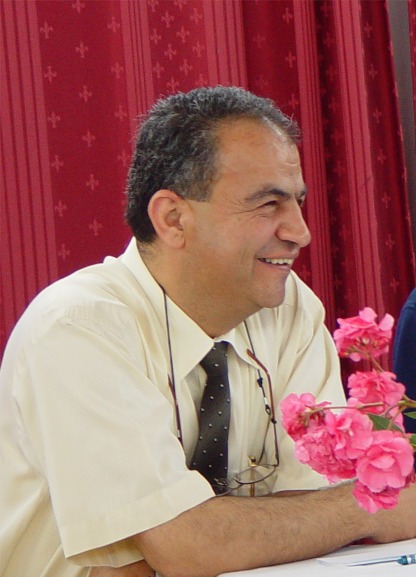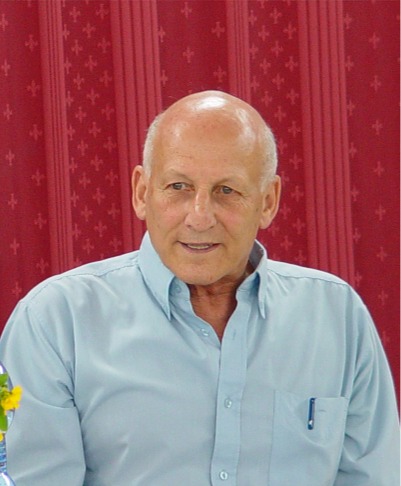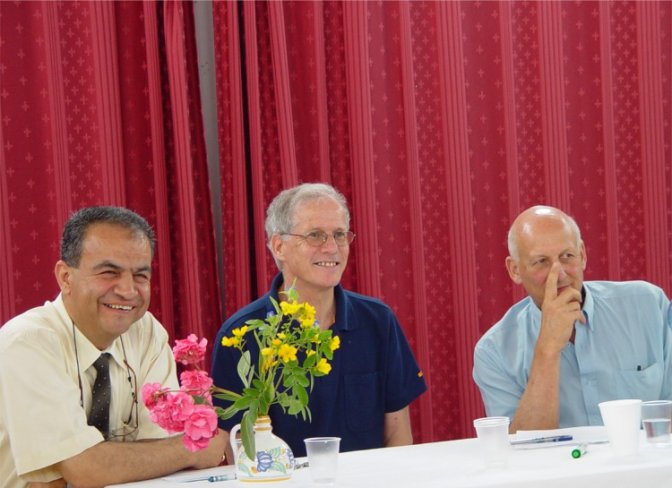Home > Oasis of Peace > Projects & Outreach > Doumia-Sakinah: The Pluralistic Spiritual Centre > Common destiny and the limits of identity
Common destiny and the limits of identity
Friday 3 June 2005
All the versions of this article: [عربي] [English] [עברית]

The third meeting in our series, “Truth and reconciliation” (which is being conducted in cooperation with the Families Forum) dealt with the complex subject of Jewish and Arab identities in Israel.
Prof. Bar-On spoke about Jewish Israeli society, which developed without clear borders of identity, especially since 1967. He spoke about its effect upon Israelis and what may be done in order to change this complex situation.
Nazir Majali spoke about Palestinian society in Israel and the borders of its identity. He discussed the need to define these inwardly and outwardly. Within this self-definition, he explored the meaning of a partnership of destiny between Israel’s Palestinian citizens and the Jewish majority.
Prof. Bar-On heads the Social Psychology Department of Ben Gurion University of the Negev. Nazir Majali is a journalist. He writes for both Jewish and Arab newspapers in Israel and sometimes in Palestine. In addition, he serves as an analyst of Israeli affairs in journals and media channels of the Arab world.
Together with Father Emil Shufani of Nazareth and Ruth Bar Shalev, Majali was one of the initiators of “From Memory to Peace” or, as it is is called in Arabic, “Memory of Pain for Peace”.
Prof. Bar-On and Majali jointly conduct an ongoing Arab – Jewish workshop at the Ben Gurion University that uses personal narrative as a basis for dialogue.
The speakers summarized their contributions as follows:
Dan Bar-On:
The lecture dealt with the monolithic identity and its limits. The Israeli monolithic identity developed first in relation to diaspora Jews, later in relation to ethnic backgrounds, and also in relation to the threat of those on the outside. It had a function of consolidation at the time of the establishment of the state. In time, the monolithic nature of this identity began a process of fragmentation (a step back or progress?). This process was arrested with the Six Day War and was complicated in its aftermath owing to the country’s lack of clear physical borders.
After October 2000, a neo-monolythic process began. It differed from its forerunner in that there continued to be a fragmentation in relation to other Jews, while there was still consolidation against the enemy on the outside. This creates a lack of clarity in the collective self-definition. The rest can be found in the book: “On the others within us”, published by the Bialik Institute of the Ben Gurion University, 1999 and 2005.
Nazir Majali:
The problem of identity of Arab Israelis is not as acute as it is often presented in Israel. From my point of view, it is very clear that I am a Palestinian Arab as these are my people. One cannot find in Israel a single Arab family that does not have next-of-kin or relatives of the second degree beyond the national borders. Therefore I am connected with the Palestinian people, love this people, suffer its pain and would do anything to procure its liberation and advancement. Yet, at the same time I am a citizen of Israel. The State of Israel is as important to me as to every other Israeli. I want it to advance, flourish and also to remain secure.
Are these two positions possible, or do they collide? Certainly there are some who wrestle with this, feel frustrated, and see the combination to be impossible. I am not one of these. Quite the opposite – I think that we Arab Israelis enjoy a very special position. I would say that a unique lot has fallen to us, where we have a special interest that our people and our state turn towards relations of peace and partnership. Additionally, we have an important role, and a national and civic responsibility, to contribute towards rapprochement between the two sides, which are both our own. To my sorrow, we do not always fulfill the requirements of this role, though sometimes, it is not our fault. Mostly we are not able to assume this role because we have placed ourselves or, rather, have surrendered to others who have placed us, in an inferior position vis-a-vis the conflict. Still, our rightful position is that of rapprochement and understanding – and for this position we will struggle.





